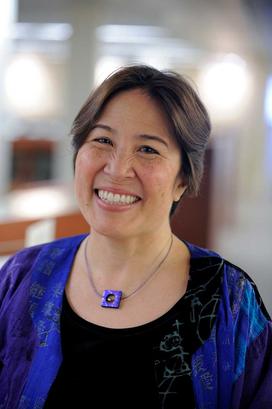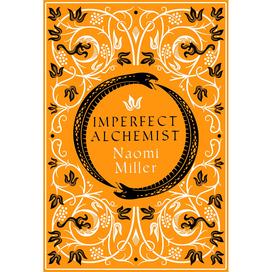Naomi Miller ’81 Reimagines Life of Literary Trailblazer Mary Sidney

Working against gender norms to establish themselves in public life, both Sidney and Commin must contend with an English society that has predetermined a woman’s abilities to be less than a man’s.
The author: Naomi Miller is a professor of English and the Study of Women and Gender at Smith College. An award-winning author of books on Renaissance women and gender, she teaches courses on Shakespeare and his female contemporaries, as well as on modern women’s adaptations and reinventions of Shakespeare.

Catherine sets the lantern on the landing and places the fingertips of one hand against the oak door for balance. Her breath comes in short gasps, her chest tight with bands of pain from climbing the three flights of stairs to the top of the house, lifting feet that seem weighted with lead.
She has been disappointed so many times, she has all but abandoned the quest. Yet, once again, even as her head swims from the dizzy spells that now afflict her, she pulls a ring of keys – brass, silver and gold – from the muslin pouch hanging from her girdle. She turns the lock with the largest one, of brass, and with an effort pushes open the heavy door.
The still-room is bathed in moonlight at this hour, its shelves and tables edged with black shadows, bearing no resemblance to the heated hive of concoction and distillation that has occupied so many of her daylight hours. Now, its cool, eerie silence is forbidding.
She lifts the lantern and enters the room with unsteady steps, inhaling the musky odours of spices and minerals. Her shaky grip sends blades of light and shadow spinning around her until she places the lantern on the worktable that stretches almost the length of one wall. Glass bottles of herbal syrups and cordials, tinctures and balms line the shelves above it, alongside ointments and lotions in pewter pots. Dried herbs from her own garden rest beside costly minerals and spices from abroad, all carefully labelled and separated according to their potential to heal or harm. Stored along the wall beneath the table are chests of ingredients ready to be used once she is well enough to resume her work – if that day ever comes.
Her husband, Henry Herbert, Earl of Pembroke and master of Wilton House, has spared no expense in support of her activity in the still-room, where she has prepared and perfected chemical and herbal remedies for the health of Wilton’s large staff and that of the farmers and villagers in the Wiltshire countryside neighbouring the estate. But Lady Catherine has not made this nocturnal visit to obtain syrup for a servant’s cough or a tincture to ease a village wife’s labour pains. Nor to seek once more the elusive remedy for her own ailments. With such skill to treat others, why is she unable to heal herself?
For years now, her production of medicines has gone hand in hand with the chimerical search for a cure – not for her persistent weakness, but for infertility. Her husband hasn’t reproached her for her failure to bear a child, yet at twenty-two and still childless after nine years of marriage, she is all too aware that the absence of an heir to the earldom blocks his hopes for the Pembroke line. She herself is beginning to lose her capacity to imagine an infant in her arms. It is the child she longs for, not the line.
Impatient with these thoughts, Catherine moves purposefully to the cabinet at the far end of the room, past the open shelves holding all the alchemical vessels essential to her work: glass aludels and retorts, silver still pots and copper pelicans. The aludels, known by alchemists as ‘eggs’ for their ovoid shape, always make her think of her womb, empty and waiting to be filled. Setting the lantern beside the cabinet, she selects the small silver key, unlocks the inlaid door and
inhales a muted medley of exotic fragrances. The lower shelves house an array of small bottles and flasks containing specialized tinctures and cordials. Another shelf bears pots of precious
spices from faraway lands: cardamom, ginger and saffron from India, nutmeg and cloves from the Spice Islands, cinnamon from Ceylon. When she lifts their lids and closes her eyes, the
distinctive note of each aroma mingles in complex harmony with its fellows, intoxicating her senses. The topmost shelf contains the rarest as well as the most dangerous substances, to be used only in small doses for extreme ailments.
The open shelf at the heart of the cabinet is lined with varied pieces of coloured stone, from crimson-veined marble to a large piece of crystalline rose quartz, the queen of her collection, attended by a handful of small gemstones cut from the same quartz – tumbled crystals, smooth and translucent in the flickering light. She rubs one between her fingers and slips it into the muslin pouch.
From the bottom of the cabinet, Catherine removes the object of her quest: a black walnut box, her husband’s gift for the safekeeping of her medicinal recipes. She runs her fingers over
the alchemical symbols engraved in the lid and sides: crossed lines beneath a circle with horns for silver, a circle around a central dot, bearing a sideways crown, for gold. She never tires of
touching these lines, which seem imbued with the power of the substances they represent.
Unlocking the box with her smallest key, of gold, she lifts the lid and fingers the sheaf of papers. She hopes to pass this precious box along to a daughter. But the collection of recipes is not yet finished. The most important remedy still eludes her. Despite her unending failures, her mounting scepticism of alchemy’s powers, she knows that if her strength ever returns she will continue the search, however hopeless.
Rosemary, sage, pennyroyal, angelica, juniper, rue. She whispers the names as if casting an incantation or calling upon spirits to fill her body – or naming the girl child she imagines instructing in the art of alchemy one day.
But now, to the task at hand – not a recipe, but a message.
Placing the box beneath her arm and lifting the lantern, Catherine turns. Moving swiftly, she passes so close to the shelves of vessels that the sleeve of her gown catches on one of the glass aludels. The vessel slides over the edge of the shelf and shatters against the floor. She freezes. Then she closes her eyes and breathes out.
Not all accidents are signs.
Catherine moves to a desk facing the moonlit window and sets down the walnut box. She sinks into the chair fronting the desk, pulls a sheet of paper from the drawer and dips her quill
into the inkpot. As she writes, her narrow shoulders relax and her breathing steadies. The words come slowly in the lantern’s flickering illumination, but now her hand is firm. At length she
sets down the quill, rereads her words and folds the paper. Taking up the sealing candle on the desk, she lights it from the lantern flame, drips crimson wax onto the sheet. With assurance arising from long practice, her fingers find the small silver pendant, blackened with use, that hangs from a thong around her neck. She pushes the circlet firmly into the wax to complete the seal. As the image hardens in the cooling wax, she replaces the pendant around her neck.
She lifts the engraved lid of the box to place the paper inside, then pauses and, dipping her quill once more, writes with a flourish –
To the next Cleopatra











No responses yet